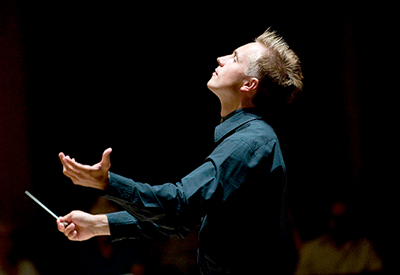by Nicholas Stevens

Leaving home for any purpose can bring exhilaration mixed with frustration and heartache. When Petrenko and the Clevelanders led with Elgar’s In the South on Friday, August 10, it became clear that the composer knew this tangle of emotions well. A product of a trip to Italy that fed Elgar’s imagination but also fed him to the local mosquitos, the overture opens with surging melodies. These fresh, athletic sounds recur, but often give way to gestures of longing and lament. In a program note, Hugh MacDonald compares the piece to Strauss’s Don Juan. Imagine that character lapsing into despair between adventures, and you have In the South.
Even with some players on break, the group sounded as subtle, impeccable, and coordinated as ever. A sweeping scale found the brass section strong and united. Principal viola Wesley Collins opted for vulnerability rather than flash in a prominent solo. Elgar’s ideas can overstay their welcome, but the piece hardly deserves its status as a rarity. Even in its final minutes, it takes surprise detours that Petrenko, with his knack for abrupt switches of energy level, handled with the air of a magician pulling rabbits from a hat.
The subsequent performance of Bartók’s Concerto for Orchestra, written after the composer moved to New York and found himself lonely, sick, and broke, clarified the extent to which Petrenko builds interpretations around surprise and contrast. This strategy makes for captivating transitions and searing climaxes. The first violins, pristine under the leadership of Peter Otto, opened the piece with a tremolo so microscopic that it took a glance to confirm the source of the airy whirring. The trumpets played into their stands, smoothing rather than blunting their sound. A flick of the fingers from Petrenko called the snare drum tattoo of the second movement into existence, and throughout the ensuing minutes the players built up layers of sound so independent as to seem incompatible — yet everything lined up perfectly.
The trombones distinguished themselves many times over, with Hakeem Bilal reveling in his guest role on bass. The third movement only caught fire around three minutes in, when Petrenko’s gestures became more expansive. On the way to the satirical spree at the heart of the fourth movement, a number of more tender phrases wanted for direction. But in the finale, as elsewhere in Petrenko’s reading, peak moments felt like vibrant islands in seas of still waters. Sometimes, slow moments in the journey make the arrival feel all the more thrilling.
Published on ClevelandClassical.com August 14, 2018.
Click here for a printable copy of this article



